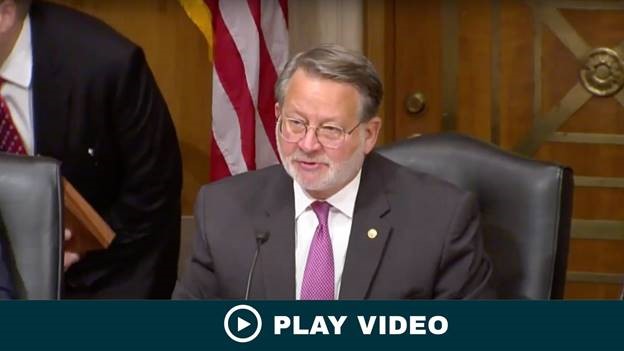VIDEO: Peters Convenes Hearing with Top National Security Officials to Examine Homeland Security Threats
Hearing Examined Federal Response to Threats, Including Domestic Terrorism, Weapons of Mass Destruction, and Drones
WASHINGTON, D.C. – U.S. Senator Gary Peters (D-MI), Chairman of the Homeland Security and Governmental Affairs Committee, convened an annual hearing with top national security and counterterrorism officials to examine evolving and persistent threats to homeland security. During the hearing, Peters raised concerns about how the ongoing conflict between Hamas and Israel is contributing to increased threats of violence in the United States, especially for Jewish, Arab and Muslim American communities. Peters and the witnesses also discussed what the Department of Homeland Security (DHS), the Federal Bureau of Investigation (FBI) and the National Counterterrorism Center (NCTC) are doing to address pressing national security threats, including international and domestic terrorism, cyber-attacks, fentanyl trafficking, weapons of mass destruction and rogue drones. DHS Secretary Alejandro N. Mayorkas, FBI Director Christopher R. Wray, and NCTC Director Christine Abizaid testified before the committee.
“Today’s hearing is an important opportunity to discuss the wide range of threats facing our nation. I’m grateful that our top national security and law enforcement officials are here this morning to provide critical updates about what their agencies are doing to address threats to our homeland security,” said Peters during his opening remarks. “The full range of these threats, from terrorism, to drones, to a changing climate, pose a great danger to our communities. Our panel of witnesses will provide an essential perspective. They will help us understand what our agencies are doing to mitigate these national security threats, and what more Congress and the Administration can do to keep Americans safe.”
To watch video of Senator Peters’ opening remarks, click here. For text of Peters’ opening remarks as prepared, click here.
To watch video of Senator Peters’ questions, click here.
Due to the ongoing conflict in the Middle East, DHS and FBI have warned of an increase in violence, hate and harassment against Jewish, Muslim and Arab American communities and institutions. Peters highlighted the Nonprofit Security Grant Program, which helps houses of worship and other nonprofit organizations, including faith-based organizations, protect themselves from potential attacks. Peters has called for $500 million in funding for the program, a significant increase, given the rising demand for these critical resources to help protect at-risk communities.
Peters also underscored the need to reauthorize and update multiple authorities that allow the DHS and FBI to counter threats posed by weapons of mass destruction and unmanned aircraft systems, as well as authorities needed to secure chemical facilities from potential terrorist activity. Peters and Mayorkas discussed the need to reauthorize the Chemical Facility Anti-Terrorism Standards (CFATS) program, which lapsed in July, to ensure that facilities that house chemicals and other materials that could be used in attacks are required to continue working with DHS on critical security reviews. Peters introduced bipartisan legislation that would reauthorize the CFATS program and ensure the DHS has the resources it needs to prevent malicious actors from weaponizing chemicals. Peters also raised concerns about the threat posed by weapons of mass destruction, which have the potential to cause everything from mass casualties to agricultural destruction. The authorities that allow DHS to counter these threats are set to expire on December 21, 2023. Peters introduced and passed out of committee bipartisan legislation to reauthorize and strengthen DHS’s Office of Countering Weapons of Mass Destruction (CWMD).
Peters also raised the threat of attacks using unmanned aircraft systems (UAS), more commonly known as drones, on large public gatherings such as major sporting events, airports, and critical infrastructure facilities. As security incidents related to drones become more common, Peters asked Wray and Mayorkas about the need to extend and update authorities that are at risk of expiring soon that allow FBI and DHS to take down threatening drones. Wray noted that if these authorities are allowed to expire, the FBI would not be able to protect large-scale sites and events – like the Super Bowl – from malicious drones. Peters introduced bipartisan legislation that would extend the critical authorities needed to combat these threats.
###
